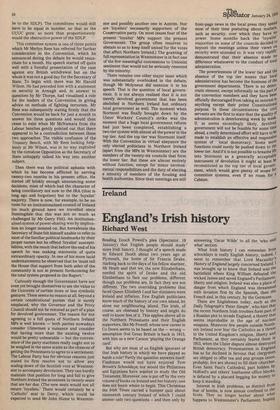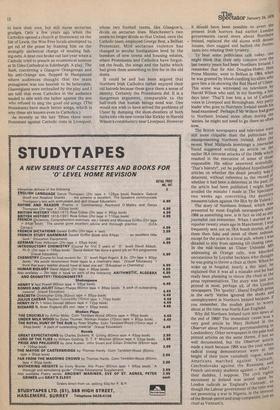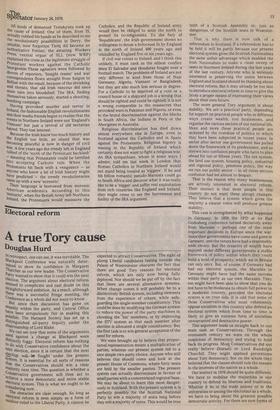Ireland
England's Irish history
Richard West
Reading Enoch Powell's plea (Spectator, 10 'January) that English people should study' more Irish history, I thought of a speech made by Edward Heath about two years ago at Plymouth, the home of Sir Francis Drake. Harking back to the days of his fellow mariner, Mr Heath said that we, the new Elizabethans, needed the spirit of Drake and the old Elizabethans to face our problems, different though our problems are. In fact they are not different. The two overriding problems that faced Queen Elizabeth I and her ministers were Ireland and inflation. Few English politicians know much of the history of our own island, let alone our neighbouring island. The Irish, of course, are obsessed by history and might do well to know less of it. This applies above all to the Northern Protestants and their English supporters, like Mr Powell, whose new career in Co Down seems to be based on the — wrong — assumption that Great Britain is back in 1913, with him as a new Carson 'playing the Orange card'.
But why are most of us English ignorant of that Irish history in which we have played so harsh a role? Partly the question answers itself: Flashman would not have enjoyed Tom Brown's Schooldays, nor would the Philistines and Egyptians have wanted to study the Old Testament. Moreover, one is put off by the very volume of books on Ireland and her history; one does not know where to begin. This Christmas the Irish Times carried a bumper quiz about nineteenth century Ireland of which I could answer only two questions — and then only by
answering 'Oscar Wilde' to all the 'who said what' section.
What Irish history I can remember from schooldays is really English history; indeed, I seem to remember that Lord MacaulaY's History of England largely concerned Ireland. I was brought up to know that Ireland was the battlefield where King William defeated the wicked James and saved England's Parliament, liberty and religion. Ireland was also a place of danger from which England was threatened with invasion first by the Spanish, then the French ind, in this century, by the Germans. There are Englishmen today, such as the Daily Telegraph's 'Peter Simple', who hint that the recent Northern Irish troubles form part of a Russian plot to invade England, a theory that seems improbable in the age of nuclear weapons. Moreover few people outside Northern Ireland now fear the Catholics as a threat to the United Kingdom's religion, liberty and Parliament, as they certainly feared them in 1913, when the Ulster dispute almost destroyed British democracy. Protestantism in England has so far declined in fervour that clergynlen are obliged to offer tea and pop groups (soca probably, live sex shows) to fill their churches. Even Saint Paul's Cathedral, part hidden bY Holford's and others' loathsome office blocks, is defaced by a placard begging for money t° keep it standing. Interest in Irish problems, as distinct from fear of bombs, is now almost confined to the Scots. They no longer bother about what happens to Westminster's Parliament, hoping
to have their own, but still nurse sectarian grudges. Only a few years ago when the Catholics opened a church at Stornoway on the Isle of Lewis, the Wee Free locals attempted to get rid of the priest by framing him on the strangely unclerical charge of stealing fishing-nets. A near-riot broke out last year when a Catholic tried to preach an ecumenical sermon at St Giles Cathedral in Edinburgh. A play, The Sash, concerning a Glasgow Orangeman and his anti-Orange son, flopped in Hampstead where audiences thought that the main protagonist was too boorish to be believable. Glaswegians were enthralled by the play and I am told that even Catholics in the audience tended to side with the father against the son who refused to sing the good old songs. (The Protestants have much better songs, which is why these are known even to Catholics.) As recently as the late 'fifties there were Protestant against Catholic riots in Liverpool, whose two football teams, like Glasgow's, divide on sectarian lines. Manchester's two teams no longer divide so that United, once the Catholic team, employed George Best, a Belfast Protestant. Mild sectarian violence has changed to secular hooliganism bred by the boredom of new towns and housing estates, where Protestants and Catholics have forgotten the feuds, the songs and the faiths which had given them something to live for in the old slums.
It could be and has been argued that Northern Irish Catholics rather enjoyed their old hatreds because these gave them a sense of identity. Certainly the Protestants did. It is a dangerous argument, comparable to the half-truth that human beings need war. One would not wish to have solved the problems of Ulster by dumping the slum-dwellers of both faiths into vile new towns like Kirkby in Harold Wilson's constituency near Liverpool. However
it should have been possible to avert the present Irish horrors had earlier London governments cared more about Northern Ireland, replaced the old slums with decent houses, then nagged and bullied the Protestants into relaxing their tyranny. To hear some politicians talk today, one might think that their only concern over the last twenty years had been Northern Ireland. / remember that Sir Alec Douglas-Home, then Prime Minister, went to Belfast in 1964, when he was greeted by blood-curdling loyalists who gave him a tie showing the Red Hand of Ulster. This scene was witnessed on television by Harold Wilson who said, in my hearing, a few days later: 'That'll lose him a lot of Catholic votes in Liverpool and Birmingham. Any Part)! leader who goes to Northern Ireland needs his head examined'. Perhaps if Mr Wilson had gone to Northern Ireland more often during the 'sixties, he might not need to go there so often now.
The British newspapers and television were still more culpable than the politicians for misrepresenting Northern Ireland. After the recent West Midlands bombings a journalist friend suggested writing an article on the earlier IRA terrorist attacks of the 1940s which resulted in the execution of some of those responsible. His editor answered scornfullY, 'That's history!', yet he published hypothetical articles on whether the death penalty was ac deterrent, without reference to the record 0' whether it had been a deterrent in the past. (If the article had been published I might have avoided the mistake I made in The Spectator two weeks ago concerning the punve measures"taken against the IRA by de Valera.) The story of Northern Ireland, which was presented by most English newspapers since 1968 as something new, is in fact as old as anY journalist can remember. When I started as a reporter twenty years ago in Manchester, I was frequently sent out on IRA bomb stories, all them then fake and most of them tedious, except for the scare in a local pub, where I wa5 detailed to stay from opening till closing time. In the mid-'sixties an Ulster Unionist MP' addressing an Orange rally, was knocked unconscious by Loyalist hecklers who thought he was going to throw a chair at them. When he woke up in hospital, nearly a day later, he explained that it was all a mistake and he had really been planning to throw the chair at the press representatives. The story was just not printed in most, perhaps all, of the London newspapers. The 'quality', liberal English press , in the early 'sixties ignored the slums and unemployment in Northern Ireland because, if you remember, the modish place to worry about at the time was North-East England.
Why did Northern Ireland turn into news at the end of 1968? The immediate cause was a very good article by Mary Holland in the Observer about Protestant gerrymandering m Londonderry. Other newspapers in the past had printed articles on the same theme,
, and if not so well documented, but the Observerarticle made a mark because 1968 was the year when radical young demonstrators were at the height of their (now vanished) vogue, wheri Americans marched against Vietnam Czechoslovaks against the Russians : French university students against — what? — their daddies, I suppose. The civil rights movement in Ireland was seized upon by London radicals as 'England's Vietnam, as though the Labour government of the time was not promoting a war in Nigeria, in the interest cruel the aeBsrivtiieshtnpaemtrs.ol and soap companies, just as All kinds of demented Trotskyists took up the cause of Ireland. One of them, from IS, actually rubbed his hands as he described to me the revolutionary possibilities in Derry; the amiable, now forgotten Tariq All became an authoritative Fenian; the amazing Workers Press, central organ of SLL (now WRP) explained the crisis as the legitimate struggle of Protestant workers against the Catholic bourgeoisie.These agitators were followed by droves of reporters, 'Insight teams' and war correspondents flown straight from Saigon to Belfast with the result, because of the shrieking and threats, that old Irish rancour did once more turn into bloodshed. The IRA, finding themselves taken seriously, started a shooting, bombing campaign.
Having provoked murder and terror in Ireland, the fashionable English revolutionaries and their media friends began to realise that the events in Northern Ireland were not 'England's Vietnam but just a revival of old sectarian hatred. They lost interest.
Because the Irish know too much history and the English too little, an island that was becoming peaceful is now in danger of civil War. A few years ago the trendy left in England talked of the 'myth of the Protestant backlash' meaning that Protestants could be terrified into accepting Catholic rule. When the Protestants hit back with a vengeance as anyone who knew a bit of Irish history might have predicted the trendy revolutionaries came up with a new 'scenario'.
Their language is borrowed from moronic American academics. According to this scenario', when the British Army left Northern Ireland, the Protestants would massacre the Catholics, and the Republic of Ireland army would then be obliged to seize the north to protect its co-religionists. To the fury of 'Republicans', the Irish government shows no willingness to douse a holocaust lit by England in the north of Ireland 400 years ago and rekindled by England five or six years ago.
If civil war comes to Ireland, and I think this unlikely, it must rank as the silliest conflict since El Salvador and Honduras fought over a football match. The problems of Ireland are not only different in kind from those of Nazi Germany, Algeria, Vietnam or Bangladesh, but they are also much less serious in degree. For a Catholic to be deprived of a vote or a council house or a shipyard job is a wrong that should be righted and could be righted; it is not a wrong comparable to the massacres that provoked wars in Pakistan and Nigeria, or even to the brutal discrimination against the blacks in South Africa, the Indians in Peru or the Aborigines in Australia. Religious discrimination has died down almost everywhere else in Europe, even in Scotland against the Catholics and in Spain against the Protestants. Religious bigotry is waning in the Republic of Ireland which certainly does not want to fight a religious war. An IRA sympathiser, whom in some ways I admire, told me last week in London that Roman Catholics in Northern Ireland would not stand being treated as 'niggers'. If he and hi S fellow romantic pseudo-Marxists could go to South Africa and discover what it was really like to be a 'nigger' and suffer real exploitation from rich countries like England and Ireland, they might come to see the barrenness and futility of the IRA argument.




































 Previous page
Previous page